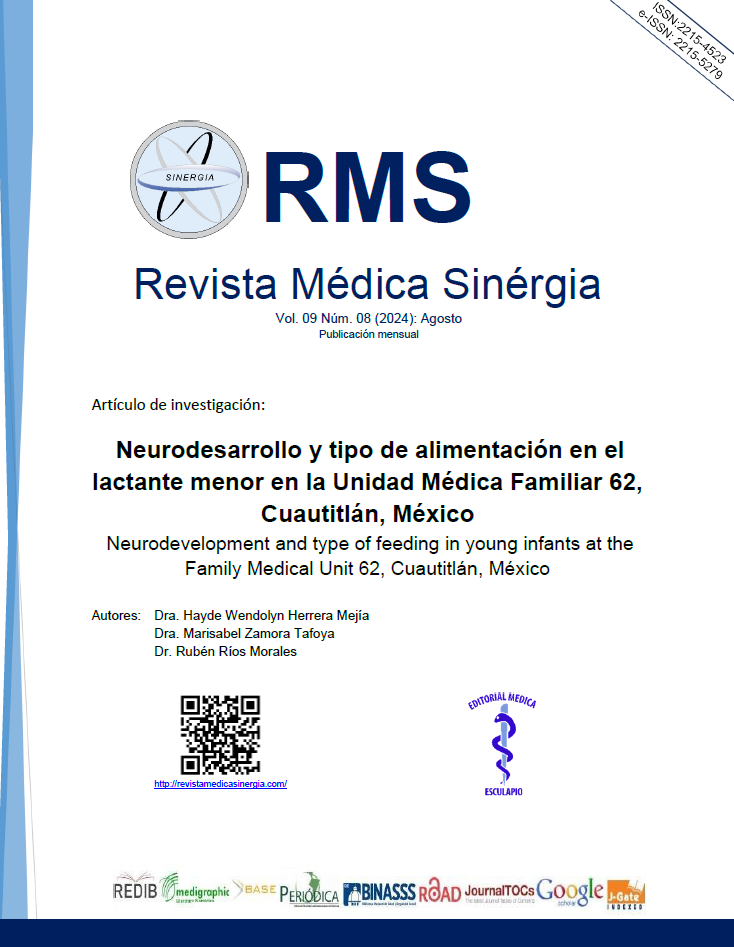Abstract
Background: The diet provided in the first 143 weeks of life can affect health; a modifiable risk factor for long-term health is infant feeding; Balanced nutrition supports adequate growth and development, which begins with breastfeeding. Sensory-motor intelligence is the ability to solve problems based on activities where perception, attitudes and movements interact. For this reason, it is important to estimate the association of neurodevelopment and the type of feeding in the young infant.
Methods: An observational, analytical, cross-sectional and prolective study was carried out in a sample of 212 of 6-month-old infants, through non-randomized, non-probabilistic sampling. Patients six months old at term, weight 10th to 90th percentile, with a history of normal pregnancy, and a complete vaccination schedule were included. Descriptive analysis was carried out with the quali-quantitative and inferential variables of the neurodevelopment variables and type of feeding (breastfeeding, substitutes, mixed feeding) applying the Kruskall-Walss ANOVA test (p=<0.005).
Results: According to the association of neurodevelopment and type of feeding, it was found that 9.5% corresponded to developmental delay and type of mixed feeding, followed by 6.2% with breastfeeding substitutes, followed by 5.1% with exclusive breastfeeding; (p=0.000).
Conclusions: It was concluded that the use of mixed breastfeeding causes greater delay in neurodevelopment, compared to the use of breastfeeding substitutes and exclusive breastfeeding.
Keywords
References
Consales A, Morniroli D, Vizzari G, Mosca F, et al. Nutrition for Infant Feeding. Nutrients. 2022; 14 (1823): 1-3. https://pubmed.ncbi.nlm.nih.gov/35565790/
Madero-Zambrano K, Marsiglia-López D, Ruidiaz-Gómez K, et al. Aplicación de prácticas clave: lactancia materna, alimentación complementaria, micronutrientes, desarrollo mental y social de niños menores de 5 años. Arch Med. 2021; 21 (1): 92-102. https://www.redalyc.org/journal/2738/273865670009/273865670009.pdf
Cortés-Rúa L, Díaz-Grávalos G. Interrupción temprana de la lactancia materna. Enferm Clin. 2019;29(4):207-215.
https://www.sciencedirect.com/science/article/abs/pii/S1130862118302651
Alibio B, Rodrigues J, Aparecida V, et al. Breastfeeding in the first six months of life for babies seen by Lactation Consulting. Rev Latino-Am. 2021; 29 (1): 1-12.
https://www.scielo.br/j/rlae/a/5CS4DJJb7J8j3mPSQHMMFWR/
Müeller A, Bohrer C, Cantarelli K, et al. Self-efficacy and exclusive breastfeeding maintenance in the first months after childbirth. Texto & Contexto Enfermagem. 2020; 29 (1): 1-14.
https://www.scielo.br/j/tce/a/m5qnp4Yj8HMQF5nfrXt8dYm/abstract/?format=html&lang=en
Escofer-Peris M, Tremoleda M, Ariza C. ¿Qué debería saber el médico de familia sobre Lactancia materna? FMC. 2022;29(2):84-89. https://www.fmc.es/es-medico-familia
Lyons K, Ryan A, Dempsey E, et al. Breast Milk, a Source of Beneficial Microbes and Associated Benefits for Infant Health. Nutrients. 2020; 12 (1039): 1-30.
https://pubmed.ncbi.nlm.nih.gov/32283875/
Nogueira I, Machado S, Vasconcelos D. Breastfeeding and infant feeding guidelines: dietary patterns and potential effects on the health and nutrition of children under two years. Rev. Bras. Saúde Mater. Infant. 2021; 21 (2): 419-428.
https://www.scielo.br/j/rbsmi/a/ZmNvcL4kRkNT93rMN8LwQpJ/
Labraña A, Ramírez K, Troncoso C, et al. Obesidad en lactantes: efecto protector de la lactancia materna versus fórmulas lácteas. Rev Chil Nutr. 2020; 47 (3): 478-483. https://www.scielo.cl/scielo.php?script=sci_abstract&pid=S0717-75182020000300478&lng=es&nrm=iso
Cheng H, Rossiter C, Size D, et al. Denney-Wilson E. Comprehensiveness of infant formula and bottle-feeding resources. Maternal & Child nutrition. 2022; 18 (1): 1-15. https://pubmed.ncbi.nlm.nih.gov/34913262/
Arredondo A, Reséndiz O, Orozco E, et al. Breastfeeding and feeding practices in the first year of life and its association with overweight and obesity of children in Mexico. Rev Bras Saúde Mater. Infant. Recife. 2021; 21 (4): 1109-1118.
https://www.scielo.br/j/rbsmi/a/zXHxY8g8DWWgDtqVgxYk9bw/
Thaweekul P, Sinlapamongkolkul P, Tonglim J, et al. Associations between the infant and young child feeding index and a nutritional status. Pediatrics International. 2021; 63 (1): 958-964. https://pubmed.ncbi.nlm.nih.gov/33289190/
Basri H, Hadju V. Breastfeeding and complementary food on nutritional status infants in Indonesia. Enferm Clin. 2020; 30(54): 191-195. https://www.sciencedirect.com/science/article/abs/pii/S1130862120301777
Paolini C, Oiberman A, Mansilla M. Desarrollo cognitivo en la primera infancia: influencia de los factores de riesgo biológicos y ambientales. Rev UCES Subjetividad y procesos cognitivos. 2017; 21 (2): 162-183. https://www.redalyc.org/articulo.oa?id=339655686008
Goode R, Lawrence A, Reimschisel T. Chapter 8 Global Developmental Delay and Regression. En: Bradley and Daroff’s Neurology in Clinical Practice. 8th Edition. Estados Unidos de América: Elsevier; 2021. p. 67-74.
Villarreal-Ríos E, Cruz-Hernández C, Morales-Morales K, et al. Guarderías infantiles. Crecimiento y desarrollo del niño. Rev Enferm Inst Mex Seguro Soc. 2021; 29(1): 20-26. https://docs.bvsalud.org/biblioref/2021/08/1283822/2020_29_20-26.pdf
Manual para la aplicación de la prueba evaluación del desarrollo infantil “EDI”. Secretaría de Salud. 2013.
Perpiñá S, Lázaro M. Desarrollo del sistema nervioso y de las funciones cognitivas en el niño y el adolescente. En: Rubio Morell Belén, editor. Manual de psiquiatría de la infancia y la adolescencia. 1ra edición. Estados Unidos de América: Elsevier; 2021. p. 44-53.
Rodríguez M. Leydi M. y Rodríguez D. Mabell E. Tipo de lactancia relacionado con el desarrollo psicomotor en niños de 0 a 6 meses, Hospital Distrital Vista Alegre – Trujillo 2019. [Tesis grado Licenciatura en Enfermería]. Universidad César Vallejo. Trujillo (Perú), diciembre 2019. https://repositorio.ucv.edu.pe/handle/20.500.12692/40347
Chico R. María E. La lactancia materna exclusiva y la lactancia artificial en el desarrollo evolutivo de los niños(as) de 3 a 6 meses que asisten al Centro de Salud San Miguelito tipo A. [Tesis de grado Licenciatura en estimulación temprana]. Universidad Técnica de Ambato. Ambato, Ecuador. Octubre, 2018.

This work is licensed under a Creative Commons Attribution-NonCommercial 4.0 International License.
Copyright (c) 2024 Array


